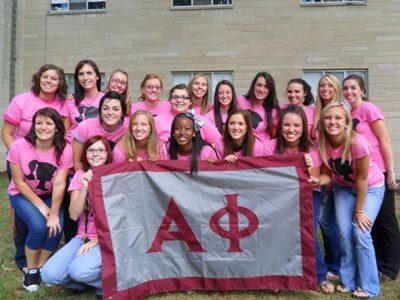Whether its accusing members of “buying friends” or the stigmatizing the “pledging process” associated with joining a fraternity or sorority, the media has certainly does not shy away from emphasizing, exaggerating, and perhaps even exposing the truth and tales of Greek life at today's colleges and universities. Whether its the catty drama portrayed on the widely watched television series Greek or the debauchery displayed in Animal House, it seems networks and production companies love to represent Greek organizations not for their original purposes of establishing lasting friendships and encouraging a common philanthropy, but towards the very different idea of groups of college students who bond over keg stands and submitting to ridiculous hazing measures. Who can forget about the “Get Your Ass Signed” mission in American Pie: Beta House or the cinder block test in Old School? But how much have TV and movies fanned the fire when it comes to Greek traditions, and how much truth lies in images and plots based around mean girls, drunk dudes, and overly submissive pledges that seem to make up the fraternities and sororities of Hollywood University?
One major part of Greek life that is almost completely ignored in classic and recent entertainment is involvement in community service that many Greek organizations take part in every semester. While it may not be the most interesting thing to build a script around, almost every establishment has a larger cause or non-profit group for which they help raise money. Erin McLaughin, a senior at University of Maryland and sister of Sigma Kappa discussed how time after time this aspect of Greek life seems to be hugely ignored; “movies only want to show partying because it makes for good entertainment…in reality Greek organizations play a huge role in raising money for their respective philanthropies.” Similarly, Elizabeth Ardery, a sophomore at Duke University who became involved in Greek life last year, argued that “sorority sisters are often portrayed as very shallow, only focused on appearances…most of the girls in my sorority are extremely focused, driven, and well rounded individuals.” Certainly not what one would think of sorority sisters after watching House Bunny, is it?
While many schools do not closely monitor their Greek organizations' involvement in non-profit work, year after year statistics reflect that sororities and fraternities continue to be active in raising money for many reputable organizations, such as the over three million dollars Zeta Tau Alpha has raised over the past twenty years as an affiliate of Susan G. Komen's Race for the Cure. And while the members of Delta Tau Chi from the classic Animal House boasted grade point averages in the ballpark of 0.2 to 1.6, in reality the National Panhellenic Conference holds a much higher GPA requirement that all members of nationally recognized Greek organizations must meet.
Movies like National Lampoon's Van Wilder and Sorority Row might leave viewers believing that Greek life is more about boozing than brotherhood, but many real life sorority and fraternity members would beg to differ. Taylor Linker, a sophomore at Salisbury University and a Zeta Tau Alpha sister, discussed how the media depicts Greek Life very differently from her experience. "Once you become involved in a Greek organization," she says, "you realize its more about the relationships you develop and the opportunities that come your way."
That being said, there are some groups whose practices perhaps align more closely with those portrayed in today's media. While many school policies and even several laws ban hazing, movies and television shows continue to depict hazing measures as a popular and entertaining tradition even in today's colleges and universities. Jimmy*, a senior fraternity brother at a large northeastern university discussed his views on media portrayal of fraternity life. “Hazing is exactly the same as you see it…actually sometimes we get ideas for how to haze pledges from movies and TV shows. The only difference is the over-emphasis on getting caught,” he says. While this striking comment does contrast the positive experiences of those mentioned earlier, it does shed light onto the medias involvement in encouraging and potentially continuing hazing rituals. The fraternity veteran goes onto share: “the houses, pledges included, view it as a right of passage that helps them shape their role in the brotherhood.”



















